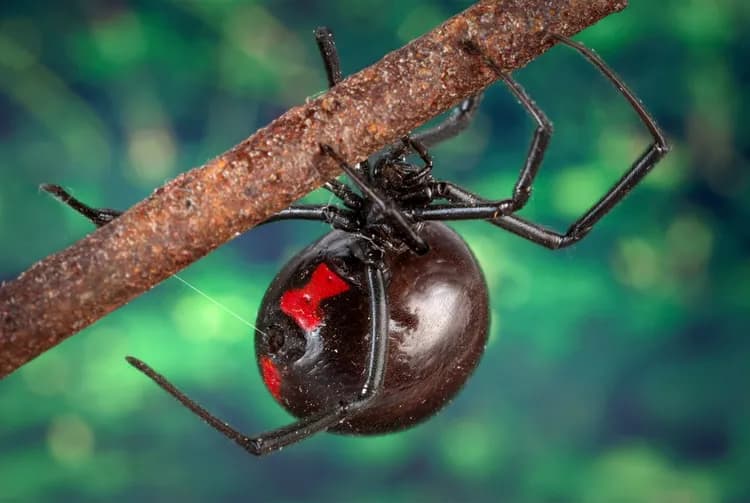What is Black Widow Spider Bite?
- The black widow spider is a medium-sized venomous spider with a red hourglass marking on its belly. The spider is found in many parts of the world, but primarily in North America
- Black Widow Spider Bite may occur following contact with a black widow, generally when they are inadvertently disturbed
- The spider bite is painful and may cause nausea, vomiting, and severe muscle cramps. However, the condition is rarely fatal in normally healthy humans
Identification
- Black widow spiders have a shiny, black body with a distinctive red hourglass-shaped marking on their abdomen
- They have long, thin legs that are usually black or dark brown in color
- Females are usually larger than males and have a rounder abdomen
What are the Causes of Black Widow Spider Bite?
- Humans are generally bitten by the female black widow spider (which may be 1.5 inches in size), mainly when they are disturbed or while protecting their eggs
- The spiders are active at night and may be found in dark corners and nooks. However, they are usually not found in places where humans live or reside
- The venom of the spider contains a neurotoxin that attacks the nervous system, causing muscle spasms, breathing difficulties, and other severe symptoms
What are the Signs and Symptoms of Black Widow Spider Bite?
The signs and symptoms of Black Widow Spider Bite can vary from one individual to another and may be mild or severe. In general, the signs and symptoms may include:
- Sharp pain at the bite site
- Severe muscle cramps from effects of the toxin/venom
- Nausea and vomiting
- Drooling and increased sweating
- General weakness
- Muscular twitching and spasms
- Light-sensitivity
- Neurological symptoms including anxiety, feeling restless, and dizziness
- Abdomen, shoulder, back, or chest pain
- Decrease in blood pressure (hypotension)
- Tremors
- Fainting
- Convulsions are rarely observed (in children)
How is First Aid administered for Black Widow Spider Bite?
First Aid tips for Black Widow Spider Bites:
- Call the Poison Control Center at 1-800-222-1222 (or your local poison control center) for further instructions
- Clean the bite site with soap and water
- Put a wet, cold cloth, or an ice pack on the bite site
- Use topical antibiotic cream on the bite spot
- Consider taking antihistamine for allergic reactions and aspirin or acetaminophen to relive pain
- Seek medical advice, before giving any kind of medications to children
- Do not apply a tourniquet, since the harm caused by the compression of the tourniquet may be significantly more than its benefits
- Seek medical help, in case of severe symptoms or an allergic reaction
- If safely possible, take the spider (or parts of it) to the healthcare facility for identification
At the healthcare facility: Anti-venom serum is seen to be effective, when there is severe pain that does not get better with the above measures, or when there is a risk of life-threatening complications, and to decrease the need for hospitalization.
Who should administer First Aid for Black Widow Spider Bite?
- First Aid for Black Widow Spider Bites should be administered by someone who is trained in providing first aid, such as a medical professional, a paramedic, or a trained first-aider
- In absence of the above, the individual who is affected, or someone nearby can administer initial first aid, following which one should seek immediate medical help
What is the Prognosis of Black Widow Spider Bite?
The prognosis is dependent on the location of bite, the severity of reaction, the overall health of the individual, and the timeliness of treatment.
- In most cases, the prognosis of Black Widow Spider Bite is typically good with appropriate home care or treatment
- Usually the signs and symptoms last 3-7 days after the bite; occasionally, it may last up to a month
- There are generally no long-term effects of black widow spider bites if prompt medical attention is given
However, in rare cases, patients may develop allergic reactions or experience chronic pain, muscle weakness, or other symptoms that persist long after the bite.
How can Black Widow Spider Bite be Prevented?
Black Widow Spider Bites may be prevented by:
- Avoid being outdoors at night in forested areas
- Use pest control in areas where the spiders are found in large numbers
- Wear gloves when working in the garden or bush
- Wear clothes that cover the entire body while outdoors in the evenings or at nights
- Avoid wearing clothes or shoes that have been lying around undisturbed for a while, especially when stored in dark and cool areas, without first inspecting them thoroughly
- Do not reach into dark nooks/corners/recesses of the house with your bare hands/foot
- Do not let clutter accumulate in various parts of the house (such as in the cellar, garage, closets, etc.)
- Install screens on doors and windows to prevent spiders from entering the house.
- Use insecticides such as DEET, and spider repellents, when necessary
What are certain Crucial Steps to be followed?
- If you live in areas where black widow spiders are prevalent, it is essential to take necessary precautions to prevent being bitten
- Learn how to identify black widow spiders and their habitats to avoid them
- Call 911 (or your local emergency help number), if the condition is serious
- Administer antihistamines, if the individual has an allergic reaction
- Do not attempt to catch or handle the spider, as this can increase the risk of being bitten
Related Articles
Test Your Knowledge
Asked by users
Related Centers
Related Specialties
Related Physicians
Related Procedures
Related Resources
Join DoveHubs
and connect with fellow professionals



0 Comments
Please log in to post a comment.